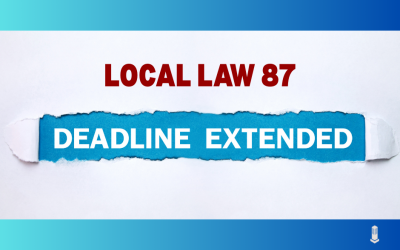
If you own or manage a building in New York City, benchmarking isn’t optional—it’s required by law. Under Local Law 84, most buildings over 25,000 square feet must track and report their annual energy and water usage to the city. These benchmarking reports provide a snapshot of building performance and help drive citywide efforts to reduce emissions, improve sustainability, and inform future regulations like Local Law 97.
But compliance with Local Law 84 isn’t just about avoiding fines. It’s about understanding how your building performs—and using that insight to improve operations, cut energy costs, and plan for long-term upgrades.
What Is Local Law 84?
Passed as part of NYC’s Greener, Greater Buildings Plan, Local Law 84 requires property owners to benchmark their building’s energy and water consumption annually using the EPA’s ENERGY STAR Portfolio Manager tool.
The results must be submitted to the NYC Department of Buildings (DOB) each year by May 1.
Who Needs to Comply?
- Buildings over 25,000 square feet
- Two or more buildings on the same tax lot with a total of 100,000 square feet or more
- Multiple condo buildings managed as a single property over 100,000 square feet
📄 Learn more and see covered buildings
What’s Included in a Benchmarking Report?
- Energy consumption data (electric, gas, steam, etc.)
- Water usage data (if applicable)
- Building use details, occupancy levels, and operating hours
- Comparison to similar buildings (via ENERGY STAR metrics)
This data not only supports Local Law 84 compliance but also feeds into the building’s Energy Efficiency Grade under Local Law 33, which must be posted publicly.
Why Benchmarking Matters
- Avoid Costly Penalties
Failure to submit your benchmarking report by the May 1 deadline can result in quarterly fines of $500, up to $2,000 per year per building. - Prepare for Local Law 97
Benchmarking data is used to calculate a building’s emissions under Local Law 97, which enforces greenhouse gas limits and steep penalties for overages. - Identify Savings Opportunities
By tracking energy and water use year-over-year, owners can spot inefficiencies, uncover cost-saving upgrades, and build stronger capital improvement plans.
Challenges of Benchmarking Without Help
Benchmarking may sound simple—but gathering the right data, entering it correctly, and ensuring it meets NYC’s requirements is anything but straightforward.
- Data Complexity: Collecting utility data for large or mixed-use buildings takes time and coordination.
- Frequent Errors: Incomplete or incorrectly formatted data can result in rejected submissions and missed deadlines.
- Changing Regulations: Benchmarking rules and building coverage thresholds may change year to year.
How Prise Helps with Benchmarking Compliance
At Prise, we work with building owners and property managers to take the stress out of benchmarking.
- Complete Data Collection & Analysis: We handle data requests, utility coordination, and formatting to ensure your building’s report is accurate and compliant.
- ENERGY STAR Portfolio Manager Management: We input and manage your benchmarking data in the required platform, helping you understand your ENERGY STAR score and how it compares to other properties.
- On-Time Filing & Compliance Monitoring
We track deadlines, ensure timely submissions, and maintain documentation for your records—helping you avoid late fees and enforcement actions.
Benchmarking Is Just the Beginning
While Local Law 84 is about reporting, it’s also the first step in a larger energy strategy. Data from your benchmarking report can guide:
- Building performance upgrades
- Capital planning
- Compliance with Local Laws 33, 87, and 97
With the May 1 deadline fast approaching, now is the time to ensure your building’s benchmarking report is accurate, complete, and submitted. Don’t let simple paperwork turn into unnecessary fines.
Let Prise help you manage your benchmarking requirements while unlocking the insights your building data can provide.
Contact us today to streamline your Local Law 84 compliance and take the next step toward better building performance.
Recent Posts
- Major Changes Coming to NYC Facade Inspections, Sidewalk Sheds: What Owners Need to Know
- Understanding NYC’s Annual Parapet Inspection Requirement
- NYC Extends Local Law 87 Deadline to March 2026: What It Means for Building Owners
- NYC Building Compliance Deadlines: Final Quarter 2025 Guide
- NYC Parking Structure Inspections: What Property Owners Need to Know



Recent Comments